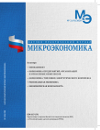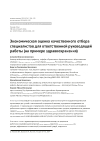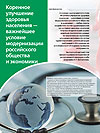Economic evaluation of the qualitative selection of specialists for responsible management work (using healthcare as an example)
DOI: 10.33917/mic-6.119.2024.104-120
In this study, the causes of unsatisfactory organization of accessible and high-quality medical care were diagnosed, directions for improving its organization were determined, and an attempt was made to economically evaluate the role of industry executives in the efficiency of using budget funds allocated for the development of health care.
The proposed approach enables the development of scientifically based risk minimization tools and mechanisms to achieve the goals of improving the organization of highly qualified, accessible and high-quality medical care.
References:
1. Cipolla C. The 5 basic laws of human stupidity, according to Cipolla. News Editors. Book. 11/05/2021. URL: https://www.naturalnews.com/
2. Cipolla C.M. The Basic Laws of Human Stupidity. 2024. URL: https://thebeerthrillers.com/2023/11/20/
3. Ганнушкин П.Б. Клиника психопатий их статика, динамика, систематика. Москва. Издательство Юрайт. 2023. 165 c.
4. Voskanyan Y., Kidalov F., Shikina I., Kurdyukov S., Andreeva O. Model of Individual Human Behavior in Health Care Safety Management System. In: Antipova T. (ed.). Russian Sklifosovsky Journal of Emergency Medical Care. 2022. № 11(2). p. 30.
5. Gill S., Mills P.D., Watts B.V., Paull D.E., Tomolo A. A Review of Adverse Event Reports from Emergency Departments in the Veterans Health Administration. J Patient Saf. 2021;17(8):898–903.
6. Panagioti M., Khan K., Keers R.N., Abuzour A., Phipps D., Kontopantelis E., et al. Prevalence, severity, and nature of preventable patient harm across medical care settings: systematic review and meta-analysis. BMJ. 2019;366:l4185.
7. Lavrenteva M. V. Is healthcare a public good or a market service? A critical analysis of the discussion of strategies and tactics for the development of the global healthcare system in post-Covid conditions based on the current debates around the works of B. Gates and the World Health Organization. 2023;7(133).
8. Zadvornaya O.L. Conceptual approaches to improving the qualifications of personnel for the implementation of lean manufacturing technologies in medical organizations providing primary health care. Medical technologies. Assessment and selection. 2020;1: 48–54.
9. Omelyanovsky V.V., Gorkavenko F.V., Ignatyeva N.V., Mukhortova P.A., Ryzhova O.R., Teptsova T.S., Kingshott A.A., Kondratieva B.B. Real clinical practice: principles of use in making management decisions and assessing healthcare technologies. Pharmacoeconomics. Modern pharmacoeconomics and pharmacoepidemiology. 2023;16(2):283–290.
10. Voskanyan Yu.E. Adverse Events Associated with the Provision of Health Care, or the Downside of Healthcare in Foreign Countries (a Systematic Review). Surgery. Pirogov Journal. 2022;4:79–98.
11. Vetoshkin S. Digitalization Has Turned Medicine into a «Mouse Fray». Report at a Meeting of the Expert Council on Modern Management and Digitalization in Healthcare of the Duma Committee on Health Protection. 06/21/2024. URL: https://svpressa.ru/blogs/article/420598/






